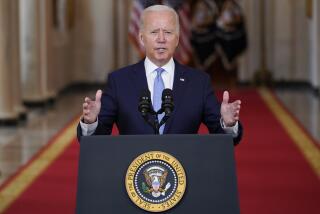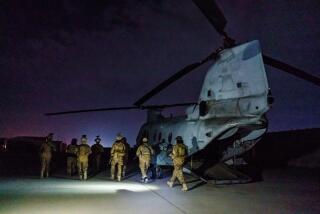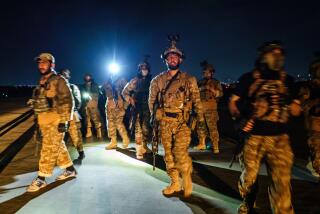Everything It Wanted--Almost
In the unfolding final acts of the war in Afghanistan, it suddenly appears that victory could bring the United States most--yet not quite all--of what it wanted when American warplanes began dropping bombs two months ago.
The Taliban regime that was accused of harboring terrorists who attacked the United States on Sept. 11 seems ready to make a break from the Al Qaeda terrorist network and cede its last stronghold, Kandahar. As opposition fighters encircle the mountain refuges of Osama bin Laden northeast of Kandahar, an interim government is beginning to take shape.
But the successor administration in Afghanistan is signaling that it may give lenient treatment to Taliban leader Mullah Mohammed Omar, whom the Bush administration has vowed to bring to justice.
Though the issue is not settled, amnesty or easy treatment of Omar could have a variety of unwanted and long-lasting consequences for the United States. However the matter is decided, it underscores that for all the weapons, troops and billions in promised aid the U.S. has brought to Central Asia, Washington is not fully in control.
The final decision on Omar’s fate could mean domestic political fallout for President Bush, whose father has been trailed for a decade by accusations that he allowed Iraqi President Saddam Hussein to escape justice at the end of the Persian Gulf War.
It might open the way for Omar to someday rally former Taliban forces and try to seize power once more.
But the move would be most serious if it meant that the new Afghan government also intends to go easy on Osama bin Laden and his Al Qaeda organization.
Though most experts don’t expect the administration of Hamid Karzai to take that approach, such a move would bring a clash with the U.S. government. The Bush administration has vowed to see the terrorists dead or behind bars views the issue as nonnegotiable.
“This is at least awkward,” said Teresita Schaffer, a retired U.S. diplomat and expert on South Asia. “If they want to [be lenient] with Bin Laden, we’ve got a problem.”
Karzai said in an interview with the British Broadcasting Corp. that there would be a general amnesty for all fighters willing to lay down their arms and that Omar would be included if he condemned all terrorism worldwide.
Clearly, for Karzai, leniency for Omar could help in a variety of ways.
Most immediately, it would help to avoid a blood bath in Kandahar. Many Taliban fighters there have vowed to battle to the end if they are not shown the leniency often shown foes in Afghanistan.
It would also assist Karzai in winning acceptance as the country’s new leader from countrymen who have been loosely, but not devoutly, affiliated with the Taliban.
And, not least, it would enable Karzai to put some distance between himself and the United States. The Pushtun tribal chief cannot afford to appear entirely a creature of the Americans if he is to broaden his appeal to Afghanistan’s diverse ethnic groups.
Still, experts point out that even if Omar is given easy treatment, the United States appears to be accomplishing most of its aims.
Its first goal regarding the Taliban was to topple the regime, they say, to send a message to governments around the world that those who support terrorists can be stripped of power.
“The most important lesson for the Taliban was not that people will be killed for this, but that if you do it, your regime will be gone,” said Ivo Daalder, a Brookings Institution scholar. “That’s the lesson we have taught them and that we’d like others to realize.”
Some experts say the United States might in some ways be better off if it allows the new Afghan government to handle Omar’s case. That could avoid a politically charged trial on charges that some experts believe could be difficult to formulate.
And some analysts predict that if Omar is turned over to the Afghan justice system, Afghan officials who lived unhappily under the Taliban could compile a list of charges that might keep him out of circulation for a long time.
U.S. officials who spoke on condition of anonymity said they believe that the United States might be able to bring Karzai around. His new government badly needs continued U.S. support.
Yet U.S. officials can’t afford to push Karzai too hard. After all, the United States has just finished helping to install the well-regarded tribal leader at the top of the new government. It would be unwise to undermine their best hope for a stable regime, experts say.
“Knocking his feet out from under him, saying ‘We don’t trust you,’ is not the way to get the new government started,” Daalder said.
Whatever happens, the disagreement is likely to bring criticism from American conservatives who have argued that the administration ceded too much authority by relying on Afghan opposition forces to fight the hard battles rather than sending in large numbers of U.S. ground troops.
“When you’re not the guy with guns on the ground, you lose control,” said Gary Schmitt, executive director of Project for the New American Century, a conservative advocacy group. “I don’t think this is a fatal problem, given our objectives. But it’s certainly the price we pay for the way we decided to go in Afghanistan.”
More to Read
Start your day right
Sign up for Essential California for news, features and recommendations from the L.A. Times and beyond in your inbox six days a week.
You may occasionally receive promotional content from the Los Angeles Times.







